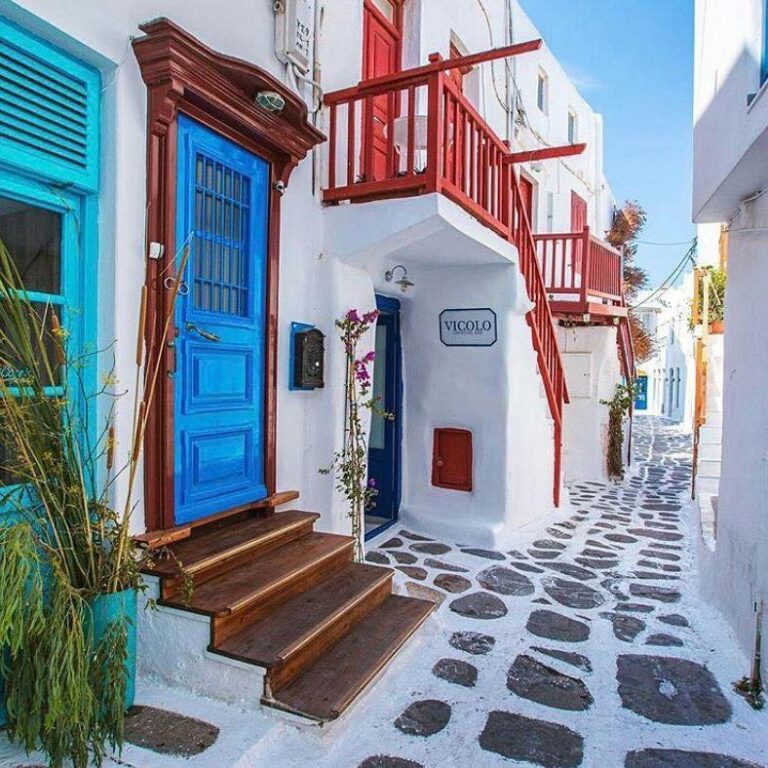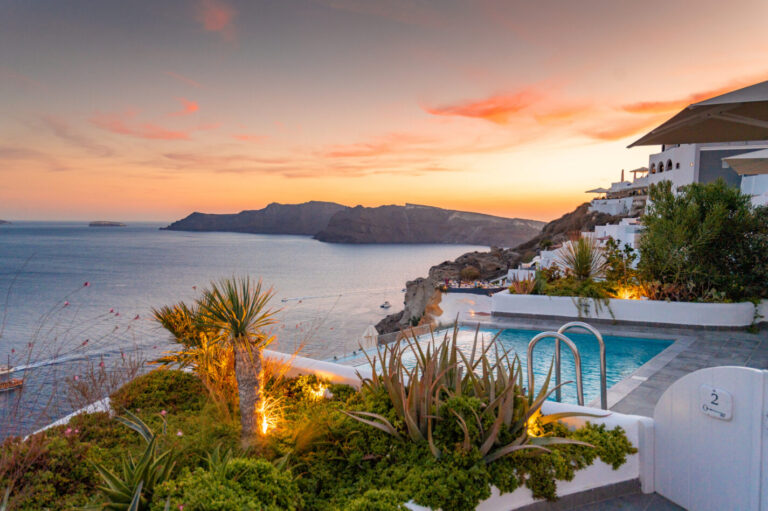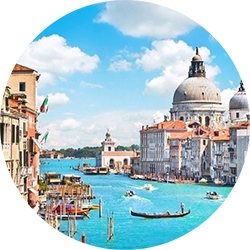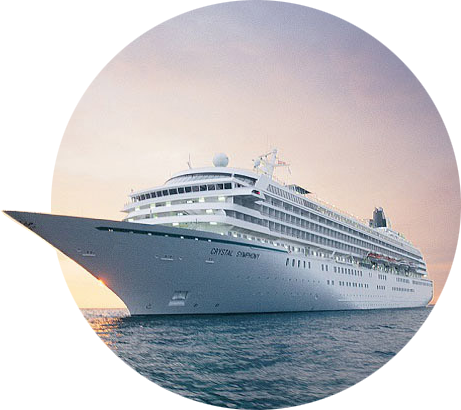Overview
Introduction

Santorini, the southernmost of the Greek Cyclades, has to be one of the world's most dramatically beautiful islands. Its unique topography is the result of a massive volcanic eruption some 3,600 years ago, which blew the middle out of the island to create a caldera, a volcanic crater filled with deep blue water from the Mediterranean Sea.
The most memorable way to approach the island is by sea. As you sail into the caldera, red-and-black sheer cliffs rise directly from the water, their tops dusted by what at first looks like a sprinkling of snow. Then, as you get closer, the snow takes the shape of Cycladic buildings hanging precariously off the hillsides. Zigzagging lines across the rock face become recognizable as roads that lead up from the sea to whitewashed houses perching on the cliffs.
These are the settlements of Fira and Oia, known for their quaint cobbled alleys, white cubic buildings, chic boutique hotels with infinity pools, fine restaurants and unforgettable sunsets. All these things add up to make Santorini a romantic holiday retreat for couples of all ages, as well as a glamorous wedding and honeymoon destination.
Santorini's spectacular setting has made it one of the most-visited islands in Greece—in peak season it receives some 60,000 visitors each day and up to five cruise ships every morning. It's also much loved by celebrities—visitors have included Beyonce, Brad Pitt and Angelina Jolie.
Must See or Do
Sights—Wander through the pedestrian-only alleys of the whitewashed cliff-top villages of Fira and Oia; take a boat trip across the caldera to the volcanic islets of Nea Kameni and Palea Kameni to swim in sulpherous springs.
Museums—The Museum of Prehistoric Thira with its displays of finds from Akrotiri.
Memorable Meals—Book a table for two overlooking the caldera at romantic Ambrosia in Oia; feast on creative Greek cuisine at Koukoumavlos in Fira; taste local specialties at Selene in hilltop Pyrgos; indulge in fusion seafood at Sea Side by Notos on Perivolos Beach.
Late Night—Have drinks in the courtyard garden before dancing the night away at Koo Club in Fira; watch the moon reflect on the open sea with cocktails and chill-out music at Theros Wave Bar in Vlihada.
Walks—Trek the stunning 8-mi/13-km cliff-top path from Fira to Oia.
Especially for Kids—Enjoy a day on the beach, complete with watersports, at Kamari on the east coast.
Geography
Santorini owes its geological peculiarities to a massive volcanic explosion approximately 3,600 years ago that blew out the center of the island. This produced its most outstanding feature, the caldera (sea-filled crater), which measures approximately 6 mi/10 km by 4.5 mi/7 km.
The archipelago is Santorini, and Thira is the crescent-shaped island that rises to the east of the caldera (although you will hear Thira called Santorini and vice-versa). To the northwest lies the small island of Thirassia, and in the middle, the black uninhabited volcanic islets of Palea Kameni and Nea Kameni, which are still active.
Most people who visit Santorini head for the stunning cliff-top settlements of Fira and Oia, on the west coast, overlooking the caldera. The island's port, Athinios, is also on the west coast. On the flatter east coast, you'll find long black-sand beaches and the purpose-built seaside resorts of Kamari and Perissa. In the middle of the island rises the former capital, hilltop Pyrgos.
Santorini has no rivers and suffers severe water shortages, but thanks to its fertile volcanic soils and high nighttime humidity, it produces flavorsome grapes, cherry tomatoes, white-skinned eggplants and fava beans.
History
As early as 3000 BC, Santorini was home to the sophisticated Minoan civilization, which built a large city at Akrotiri in the southwest region of the island. They were a peaceful seafaring people, and Akrotiri was their largest settlement outside Crete. However, around 1600 BC, a catastrophic volcanic explosion devastated the island, burying Akrotiri below lava, where it lay preserved for more than three millennia. It was only discovered in the late 19th century by workmen who were quarrying the area for pumice stone.
Following the eruption, Santorini lay deserted and uninhabitable for several hundred years. Then, in the ninth century BC, another important period in the island's history began, when Dorian colonists from mainland Greece founded ancient Thira on a rocky headland overlooking the southeast coast. Their leader, Theras, gave his name to the island. The settlement had an agora (marketplace), a theater, temples and sanctuaries, and it was later taken over by the Romans.
During the 13th century, at the time of the Crusades, the Venetians annexed the island to the Duchy of Naxos and began calling it Santorini, after the tiny Byzantine church of Agia Irini (Santa Irini in Italian) in Perissa (now in ruins). From 1579 to 1821, the island was occupied by the Ottoman Turks.
Up until the early 20th century, Santorini had a large merchant fleet, transporting merchandise between ports throughout the East Mediterranean and exporting home-produced wines. The island was officially reunited with Greece in 1830.
In 1956, Santorini was hit by a devastating earthquake, which destroyed hundreds of homes, including most of the town of Fira, which was subsequently rebuilt. Many families decided to emigrate. The local economy was revived in the late 1970s with the advent of tourism, which provides a living for most of the islanders.
Potpourri
When archaeologists began excavating Akrotiri, they uncovered a warren of furnished buildings and hordes of painted ceramic pots but not one human corpse, leading them to believe that the Minoan residents who lived there had somehow been forewarned of the volcanic explosion in 1600 BC and fled before it took place.
The fourth-century BC Greek philosopher Plato introducted the legend of Atlantis, and some believe that Akrotiri on Santorini was the legendary sunken city.
It seems the Minoans kept monkeys as exotic pets. The Blue Monkeys fresco from Akrotiri accurately depicts monkeys in various positions, suggesting that the artist had studied them in real life. However, as monkeys were not indigenous to Greece, they must have been transported there, possibly from Egypt, where they were highly regarded and held religious significance.
Movies filmed on the island include Tomb Raider: The Cradle of Life, Sisterhood of the Traveling Pants 2 (2008), Santorini Blue (2010) and D'Agostino (2011).
Location
Santorini is a popular stop for cruise ships sailing the East Mediterranean during the warmer months. Most ships anchor in the caldera beneath Fira, perched on the cliff tops 1,000 ft/310 m above the water, and transport passengers to the pier at Skala in small boats.
From Skala, there are three ways to reach Fira: Take the cable car (hours change seasonally, but usually operates every 20 minutes about 6:30 am-9 pm; 6 euros); walk up a steep zigzag path of 580 steps; or hire a mule (following the same zigzag path). Once in Fira, you'll find countless restaurants and cafes, as well as taxis.
Shore Excursions
Most cruise ships sailing the East Mediterranean stop for a full day at Santorini, putting down anchor in the caldera and transporting passengers directly to Fira, the capital. You could easily spend the entire day in Fira, exploring its pretty, car-free alleys, checking out its museums, browsing its shops and indulging in a long lunch overlooking the caldera. However, neighboring Oia, 8 mi/12 km up the coast, is smaller and prettier than Fira and more than worth a visit.
Alternatively, many visitors to the island enjoy a guided tour of its vineyards and wineries, where you can taste highly esteemed white wines and buy bottles to take home. If you're dreaming of relaxing on golden sands and swimming in turquoise-blue water, save a day on the beach for another island—Santorini's beaches are mostly black sand, which makes them very hot, especially during the afternoon.
Note that one of the island's top sights, the world-renowned archaeological site at Akrotiri, has reopened after the construction of a new bioclimatic roof covering the entire excavation.












































